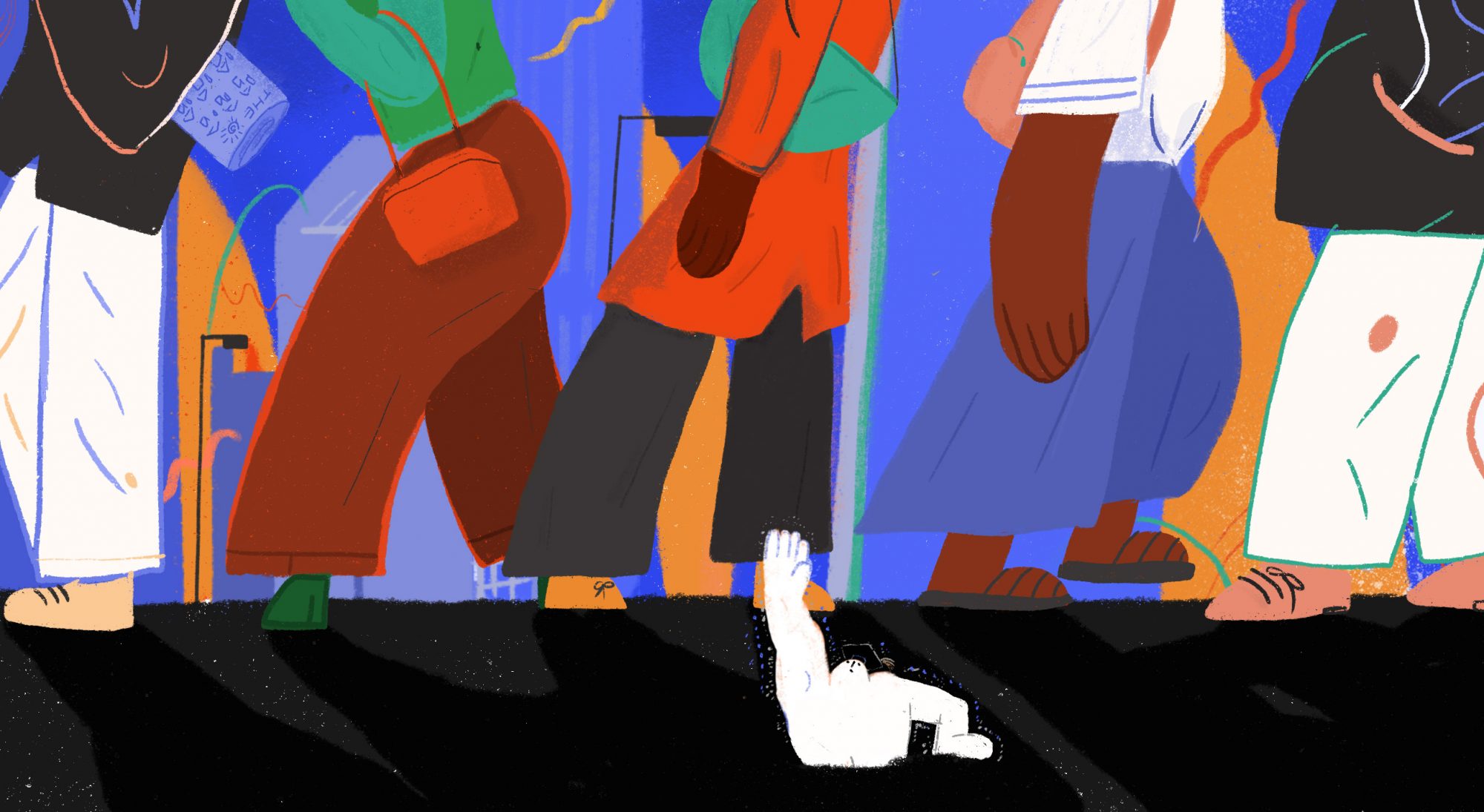
No Regrets
Studying art and design is often framed as a risky decision. Jack Williams argues that instead of shaming students for choosing to follow their passion, we ought to look to universities to teach them how to make their skills relatable to working life.
Words by Jack Williams
Illustration by Lily Kong
I was at a party a few weeks ago when someone began the discussion of the stupid things we did as teenagers. A few arrests popped up, a couple of VD’s, someone once threw a brand new PlayStation out of fourth story window in a misguided attempt to impress a girl (he failed).
All of these paled in comparison to the crowning achievement, coming from friend who told us, without hesitation, that he once was kicked out of a Major Lazer concert for being obviously and unapologetically underage. He then went outside and, in his frustration, headbutted a concrete pillar.
He paused while we laughed, then reminded us that less than three months later he was allowed to take out a £27,000 loan so he could get a fine art degree.
We all laughed again at his expense, and then we all realised that we had done similar things, just without a concussion due to concrete-cranial impact.
University years have typically been viewed by the older generation as the prime time to make mistakes. You get questionable tattoos, sleep with odd people, eat kebabs five nights a week, and maybe do a little bit of work at some point in the middle of that, etc etc, graduate then get a real job. It’s how Dad did it, it’s how Mum did it, and it’s how you’ll do it too.
But so many people view the actual act of getting a creative degree itself as a mistake. There is constant discussion in the press, ranging in the political spectrum from The Guardian (Is your university degree barely written the paper it’s written on?) to The Telegraph (Our over-funded Universities are spawning a nation of educated paupers).
These articles follow a strikingly similar set-up; a statistic, calling back to an earlier simpler time when only the wealthy could go to university, followed by calling arts university a “noble” and “admirable” pursuit before lamenting the “useless” degrees that people do (mostly arts or creative degrees, with a specific shout out to the folk music course at Newcastle).
Finally, they present their coup de grace; the unimaginable horror that comes with a graduate working as a plumber, or a babysitter, or even as Sonia Sodha put in The Guardian last year, a caretaker. God forbid.
Oversimplified and under-considered, these writers make the choice to place the blame on students who pursue degrees in the arts even after the realisation that they are doing what is told of them by “the adults”. This is an idea and psychological choice that merits in itself not just an article, but perhaps an entire book, and definitely the further consideration of their readership.
The standard for university success has become entirely wrapped in something that measures to the advantage of universities such as LSE or LBS; the standard earning of students upon graduation and beyond. And, if gauged purely by that standard, the outcome is not admittedly great for art students.
Taylor McGraa, Education Officer at Goldsmiths University’s student union, puts it best; “With a hard focus on graduate outcomes and ‘employability’, there is becoming a bit of a skills gap in the skills needed for a healthy, happy working life. Learning to manage workload, giving yourself boundaries, listening honestly to others and communicating with patience are things that just aren’t spoken about nearly enough.”
Depressingly, the median male arts student earns less than they would have done if they had simply never gone to university, while the average female student only earns 6% more than their non-graduate counterparts. This is a problem, and one that needs to be addressed if for no other reason than to allow art graduates the space to breathe upon graduation.
But the fix to this cannot be to disallow students from studying the topic of their choice, and force them into something more immediately and monetarily practical. Even with this knowledge, when I spoke to arts students they do not regret their choice of degree the least.
Freya Edwards, a graduate from Chelsea College of Art, believes that while “fine art, and the way it was taught… was more about teaching you how to question and explore ideas than anything else, and having three years to explore your ideas about the world is such a gift”, that “the course could have provided more information and guidance about practical things that most students will probably need once they finish studying; such as how to organise your finances if you decide to become freelance.”
And there’s a dynamic that is worth addressing. Rather than shaming students for following their interests, the onus needs to be on Universities to teach students how to sell their work as transferable skills upon graduation.
In a report titled ‘Generation Regret’ by insurance company Aviva, 37% of graduates feel that they regret their degree choice, with a further 49% feeling that they would still have ended up in the same place without their degree. A massive 80% felt that they were not getting enough out of university given the £9,000 price tag that goes with university. But can it be said that the issue lies with students and not the universities that are educating them?

It’s hard to argue with these metrics, but some of this doesn’t really add up. The average graduate in the UK makes £6,000 extra per year than the average non-grad. But there’s also a valid comparison here to one of the “safer degrees”.
The Higher Education Statistics Agency (HESA for short) published their most recent statistics in 2017. Any statistic-heads out there should take a minute and go and play with their graphs; data compiled over the course of four years shows where students ended up with their degrees in practically every category you could imagine; race, gender, health, upbringing, what kind of work they do now (with 64% in permeant contracts and 6% self-employed, it’s still a long way to go until the work revolution).
It is tempting to check the box to sort by unemployed on each one, but it is a statistic that doesn’t actually tell the full story. It is deeper aspects of these statistics, like the fact that you are more likely to find work in the UK if your parents didn’t have education beyond university or that you are far more likely to go into academia if you went to a private school may be facts that do not surprise people, but they are certainly worth noting.
What does surprise people is what comes out of the outcomes studied by section. Right now I want you to guess which university subject leaves their graduates with the largest percentage of unemployment after graduation.
It’s not art and design (6%).
It’s not philosophy (also 6%).
It’s not education either (a mind-blowingly low 2%).
You’re probably not going to guess it. It’s computer science, with a whopping 9% unemployment rate a year after graduation, and this is an improvement on the 2009 number of a remarkably high 18%.
In 2016, the government commissioned a study by Sir Nigel Shadbolt, the Professorial Research Fellow in the Department of Computer Science at the University of Oxford, to figure out what was causing this divide. He responded by calling the hiring gap for a “matter of great urgency” before laying out ten recommendations to fix this problem, highlighting the lack of understanding on behalf of both SME’s and large internationals as to what to expect from new graduates. Essentially, companies expect veteran experience and ability to fix problems but with a graduate price tag, causing an influx of jobs available to those at the top of the market while those at the bottom scratch out a living in piece work.
Funny how similar that sounds to the exact problem in the arts. And yet, there have been no recent reviews to try and address this problem for creative graduates. Instead, there is questionable journalism followed by claims that creative degrees are not economically viable.
Taylor McGraa again puts forward; “Currently, the government uses graduate earning stats to determine how high in the league tables a university should be. Because of this, we will start to see more and more universities trying to get their graduates into the highest earning jobs as quickly as possible… It’s a system set to fail, and one that will only serve to deepen the skills gap even further.”
The realisation you have pretty quickly is that there is a divide in what is expected of university graduates. Doing an art-based degree is risky, but it’s no riskier than doing a degree in something that we view as “safe” such as computer science.
Our metrics for success are skewed and so limited as long as they are dependent upon one thing; whether your bank account is credited more than £25k per year, and if your skillset keeps the economy ticking along nicely while right-wing pundits and think tanks continue to call out the student living in luxury studying underwater basket weaving and sleeping until 4pm. Their favourite boogeyman studies art, hasn’t worked a day in their lives, and never will.
Meanwhile, the exemplar of a “useful” student studies STEM, immediately gets a job upon graduation, and gives back concrete and measurable contributions to the economy. In neither case can I say for certain someone like that exists. As with all things, the area is grey at best, but one thing is for certain; universities cannot exist to purely bring around short term economic benefit, but rather, they must strive to enrich the cultural intellect of the nation they represent while assisting their student bodies in maintaining their lifestyles after graduation.
The graduate defines the use of their individual degree, no one else. Law, tech, finance, and medicine, are all noble pursuits and are necessary to sustain life. But we cannot subside alone on what is necessary, but instead must look to things that make our existence bearable, especially if that’s where your passion lies. If you did or do the folk music degree at Newcastle or any other creative degree, know that your skills to communicate, practice, and learn with patience and passion in equal measure are the merits of the future and are as valuable as you make them, not as The Telegraph or The Guardian labels them.
The worst thing we can continue to do as a public is look at struggling graduates and tell them, “well, sorry, but that’s just the way it is.” Students must be able to make their choice in the knowledge that there is a higher body ready to teach them how to make their skills relatable to working life. They must follow their passions, not their pockets, for the choice that will undoubtedly change their lives.
Just stay away from concrete pillars before making your decision.

No Regrets is part of our new independent editorial series ‘The Crit’ which assesses the state of creative education from a variety of perspectives. The intention of the series is to instigate conversations that can open up clearer lines of communication between students, educators, institutions, graduates and industry. We want to improve transparency, empathy and dialogue between the key stakeholders because we believe wholeheartedly in the value of creativity and want to support those who teach and learn it alike. This feature is written by the brilliant Jack Williams from UnderPinned and illustrated by the amazingly talented Lily Kong.









